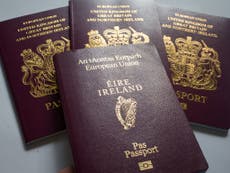Confusion about who can get an Irish passport shows how poorly informed we are about Brexit
These instances don’t just show up the infuriating hypocrisy displayed by some of the loudest proponents of Brexit. They also demonstrate that there’s a need for better information on what the UK’s departure from the EU will mean for people

The rush to claim Irish heritage and ensure your rights to freedom of movement among the 27 EU states that will remain after 29 March next year shows no sign of slowing down, with Irish passport applications surging again in the first half of this year.
Since the Brexit vote, people have been scrabbling around trying to find an Irish grandparent to ensure their ability to live and work in the rest of the EU.
Of course, relatives from other European nations will do too, but it’s thought that at least 10 per cent of the British population, not including Northern Ireland, qualifies for Irish papers. Ireland also has one of the broadest sets of criteria for obtaining a passport – British citizens are eligible to apply if their parents or grandparents were Irish citizens born in Ireland.
In the first six months of this year, 44,900 applications for Irish passports were received from British citizens, almost as many as were received in total during 2015, and officials are now expecting this year to be the busiest ever for applications.
It’s good to know that people who don’t want to be cut off from living and working in the EU after Brexit can take steps to ensure that won’t happen.
However, this rush to claim Irish heritage en masse has also shone a light on some of the misconceptions about the UK’s relationship with Ireland, and about Brexit in general.
Earlier this month, the Tory MP for North West Leicestershire, Andrew Bridgen, revealed that he believed he could go to Ireland and ask for a passport “as an English person”. Now, while he could certainly head over to Dublin and ask at the passport office, being English would have nothing to do with whether he got one or not. Unless someone can claim Irish citizenship, they don’t get a passport.
But it’s worrying that someone so intent on taking the UK out of the EU apparently has such a flimsy grasp of what that means. Has he been telling his constituents that they don’t need to worry about Brexit, because the “reciprocal agreement” between the UK and Ireland (which doesn’t actually exist) means they’ll still be entitled to an EU passport? If so, that’s appalling.
It’s also incredibly hypocritical, merrily pursuing Brexit at any cost, but all the while operating under the assumption that you’ll retain all the benefits of EU citizenship – even if that assumption is completely misguided and wrong.
It’s not the first time the issue of passports has highlighted the hypocrisy of certain Brexit backers. Days after the EU referendum in 2016, Ian Paisley Jr MP was telling his constituents to apply for an Irish passport. “My advice is if you are entitled to (a) second passport then take one,” he said on Twitter.
That’s the same Paisley Jr who campaigned for a Brexit vote and whose party has since done their best to drive the UK towards a hard Brexit, despite the fact that Northern Ireland voted to remain.
These instances don’t just show up the infuriating hypocrisy displayed by some of the loudest proponents of Brexit. They also demonstrate that there’s a need for better information on what the UK’s departure from the EU will mean for people.
Bridgen is not the only person who doesn’t know the ins and outs of who can and can’t obtain an Irish passport – reactions on Twitter show there’s a lot of confusion out there.
But he is in a position of influence and responsibility. He should know that there is no reciprocal passport agreement between Ireland and the UK. He could know that, easily, if he did even the tiniest bit of research.
The politicians who’ve campaigned for Brexit should be able to provide a clear picture of what it means, not spread misinformation about how people’s lives will be affected. If a no-deal Brexit, and all the potentially awful consequences that entails, comes to pass, it would probably be a good idea not to make things even worse by having to backtrack on previous false advice.
In the meantime, I wish anyone trying to track down an Irish granny the best of luck – if Brexit does turn into a total disaster, we’ll want all the options we can get.





Join our commenting forum
Join thought-provoking conversations, follow other Independent readers and see their replies